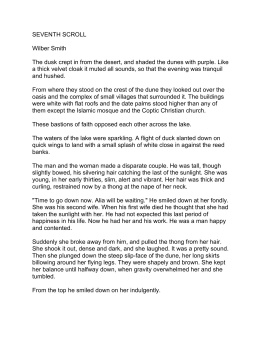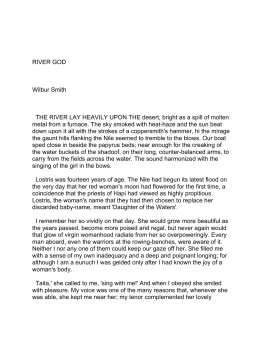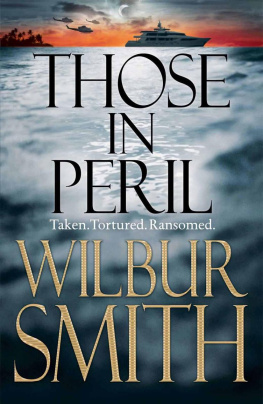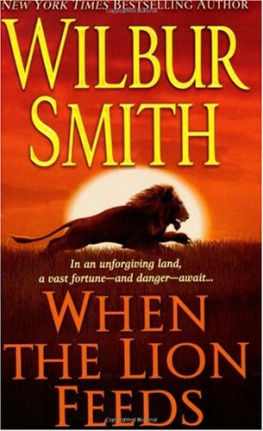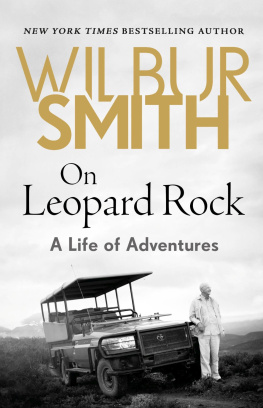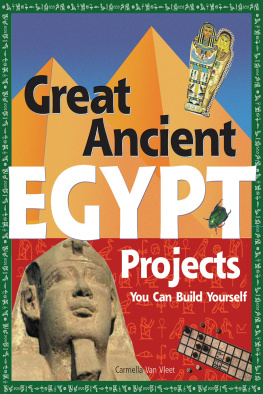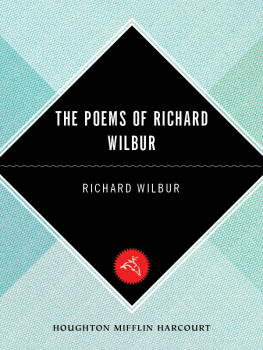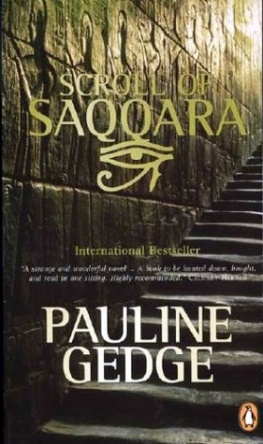Wilbur Smith - The Seventh Scroll (A Novel of Ancient Egypt)
Here you can read online Wilbur Smith - The Seventh Scroll (A Novel of Ancient Egypt) full text of the book (entire story) in english for free. Download pdf and epub, get meaning, cover and reviews about this ebook. year: 2008, publisher: St. Martins Press, genre: Art. Description of the work, (preface) as well as reviews are available. Best literature library LitArk.com created for fans of good reading and offers a wide selection of genres:
Romance novel
Science fiction
Adventure
Detective
Science
History
Home and family
Prose
Art
Politics
Computer
Non-fiction
Religion
Business
Children
Humor
Choose a favorite category and find really read worthwhile books. Enjoy immersion in the world of imagination, feel the emotions of the characters or learn something new for yourself, make an fascinating discovery.
- Book:The Seventh Scroll (A Novel of Ancient Egypt)
- Author:
- Publisher:St. Martins Press
- Genre:
- Year:2008
- Rating:3 / 5
- Favourites:Add to favourites
- Your mark:
- 60
- 1
- 2
- 3
- 4
- 5
The Seventh Scroll (A Novel of Ancient Egypt): summary, description and annotation
We offer to read an annotation, description, summary or preface (depends on what the author of the book "The Seventh Scroll (A Novel of Ancient Egypt)" wrote himself). If you haven't found the necessary information about the book — write in the comments, we will try to find it.
The Seventh Scroll (A Novel of Ancient Egypt) — read online for free the complete book (whole text) full work
Below is the text of the book, divided by pages. System saving the place of the last page read, allows you to conveniently read the book "The Seventh Scroll (A Novel of Ancient Egypt)" online for free, without having to search again every time where you left off. Put a bookmark, and you can go to the page where you finished reading at any time.
Font size:
Interval:
Bookmark:
SEVENTH SCROLL
Wilber Smith
The dusk crept in from the desert, and shaded the dunes with purple. Like a thick velvet cloak it muted all sounds, so that the evening was tranquil and hushed.
From where they stood on the crest of the dune they looked out over the oasis and the complex of small villages that surrounded it. The buildings were white with flat roofs and the date palms stood higher than any of them except the Islamic mosque and the Coptic Christian church. These bastions of faith opposed each other across the lake.
The waters of the lake were sparkling. A flight of duck slanted down on quick wings to land with a small splash of white close in against the reed banks.
The man and the woman made a disparate couple. He was tall, though slightly bowed, his silvering hair catching the last of the sunlight. She was young, in her early thirties, slim, alert and vibrant. Her hair was thick and curling, restrained now by a thong at the nape of her neck.
"Time to go down now. Alia will be waiting." He smiled down at her fondly. She was his second wife. When his first wife died he thought that she had taken the sunlight with her. He had not expected this last period of happiness in his life. Now he had her and his work. He was a man happy and contented.
Suddenly she broke away from him, and pulled the thong from her hair. She shook it out, dense and dark, and she laughed. It was a pretty sound. Then she plunged down the steep slip-face of the dune, her long skirts billowing around her flying legs. They were shapely and brown. She kept her balance until halfway down, when gravity overwhelmed her and she tumbled.
From the top he smiled down on her indulgently.
Sometimes she was still a child. At others she was a grave and dignified woman. He was not certain which he preferred, but he loved her in both moods. She rolled to a halt at the bottom of the dune and sat up, still laughing, shaking the sand out of her hair. "Your turn!" she called up at him. He followed her down sedately, moving with the slight stiffness of advancing age, keeping his balance until he reached the bottom. He lifted her to her feet. He did not kiss her, although the temptation to do so was strong. It was not the Arab way to show public affection, even to a beloved wife.
She "straightened her clothing and retied her hair before they set off towards the village. They skirted the reed beds of the oasis, crossing the rickety bridges over the irrigation canals. As they passed, the peasants returning from the fields greeted him with deep respect.
"Salaam aleikum, Doktari! Peace be with you, doctor." They honoured all men of learning, but him especially for his kindness to them and their families over the years.
Many of them had worked for his father before him. It mattered little that most of them were Moslem, while he was a Christian.
When they reached the villa, Alia, the old housekeeper, greeted them with mumbles and scowls. "You are late. You are always late. Why do you not keep regular hours, like decent folk? We have a position to maintain."
"Old mother, you are always right," he teased her gently. "What would we do without you to care for us?" He sent her away, still scowling to cover her love and concern for him.
They ate the simple meat on the terrace together, dates and olives and unleavened bread and goat's milk cheese. It was dark when they finished, but the desert stars were bright as candles.
"Royan, -my flower." He reached across the table and touched her hand.
"It is time to begin work." He stood up from the table and led the way to his study that opened out on to the terrace.
Royan Al Simma went directly to the tall steel safe against the far wall and tumbled the combination. The safe was out of place in this room, amongst the old books and scrolls, amongst the ancient statues and artefacts and grave goods that were the collection of his lifetime.
When the heavy steel door swung open, Royan stood back for a moment. She always felt this prickle of awe whenever she first looked upon this relic of the ages, even after an interval of only a few short hours. "The seventh scroll," she whispered, and steeled herself to touch it. It was nearly four thousand years old, written by a genius out of time with history, a man who had been dust for all these millennia, but whom she had come to know and respect as she did her own husband. His words were eternal, and they spoke to her clearly from beyond the grave, from the fields of paradise, from the presence of the great trinity, Osiris and Isis and Horus, in whom he had believed so devoutly. As devoutly as she believed in another more recent Trinity.
She carried the scroll to the long table at which Duraid, her husband, was already at work. He looked up as she laid it on the tabletop before him, and for a moment she saw the same mystical mood in his eyes that had affected her. He always wanted the scroll there on the table, even when there was no real call for it. He had the photographs and the microfilm to work with. It was as though he needed the unseen presence of the ancient author close to him as he studied the texts.
Then he threw off the mood and was the dispassionate scientist once more. "Your eyes are better than mine, my flower," he said. "What do you make of this character?"
She leaned over his shoulder and studied the hieroglyph on the photograph of the scroll that he pointed out to her. She puzzled over the character for a moment before she took the magnifying glass from Duraid's hand and peered through it again.
"It looks as though Taita has thrown in another cryptogram of his own creation just to bedevil us." She spoke of the ancient author as though he were a dear, but sometimes exasperating, friend who still lived and breathed, and played tricks upon them.
"We'll just have to puzzle it out, then," Duraid declared with obvious relish. He loved the ancient game. It was his life's work.
The two of them laboured on into the cool of the night. This was when they did their best work. Sometimes they spoke Arabic and sometimes English; for them the two languages were as one. Less often they used French, which was their third common language. They had both received their education at universities in England and the United States, so far from this very Egypt of theirs. Royan loved the expression "This very Egypt' that Taita used so often in the scrolls.
She felt a peculiar affinity in so many ways with this ancient Egyptian. After all, she was his direct descendant.
She was a Coptic Christian, not of the Arab line that had so recently conquered Egypt, less than fourteen centuries ago. The Arabs were newcomers in this very Egypt of hers, while her own blood line ran back to the time of the pharaohs and the great pyramids.
At ten 'clock Royan made coffee for them, heating it on the charcoal stove that Alia had prepared for them before she went off to her own family in the villa . They drank the 9 sweet, strong brew from thin cups that were half-filled with the heavy grounds. While they sipped, they talked as old friends.
.. For Royan that was their relationship, old friends. She had known Duraid ever since she had returned from England with her doctorate in archaeology and won her job with the Department of Antiquities, of which he was the director.
She had been his assistant when he had opened the tomb in the Valley of the Nobles, the tomb of Queen Lostris, the tomb that dated from about 1780 BC.
She had shared his disappointment when they had discovered that the tomb had been robbed in ancient times and all its treasures plundered. All that remained were the marvelous murals that covered the walls and the ceilings of the tomb.
It was Royan herself who had been working at the wall behind the plinth on which the sarcophagus had once stood, photographing the murals, when a section of the plaster had fallen away to reveal in their niche the ten alabaster jars. Each of the jars had contained a papyrus scroll. Every one of them had been written and placed there by Taita, the stave of the queen.
Next pageFont size:
Interval:
Bookmark:
Similar books «The Seventh Scroll (A Novel of Ancient Egypt)»
Look at similar books to The Seventh Scroll (A Novel of Ancient Egypt). We have selected literature similar in name and meaning in the hope of providing readers with more options to find new, interesting, not yet read works.
Discussion, reviews of the book The Seventh Scroll (A Novel of Ancient Egypt) and just readers' own opinions. Leave your comments, write what you think about the work, its meaning or the main characters. Specify what exactly you liked and what you didn't like, and why you think so.

